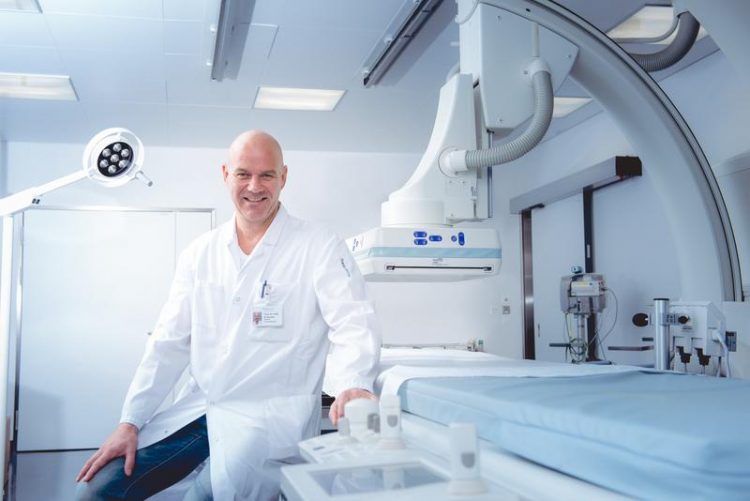World first: Massive thrombosis removed during early pregnancy

Prof. Dr. med. Nils Kucher conducted the challenging intervention under ultrasound guidance. Inselspital, Bern University Hospital
Monday afternoon, three o‘ clock: A young woman arrives at Inselspital Bern with a painful swelling in her left leg. She is ten weeks pregnant. A medical examination reveals the patient has a massive thrombosis of the pelvic veins as well as a large, free floating clot in the inferior vena cava in close proximity to her heart. She is deemd to be at extreme mortal danger from pulmonary embolism since the clot in the inferior vena cava is mobile.
Team consultation on the best treatment
Taking the woman’s pregnancy into consideration, a panel of physicians from the Departments of Angiology, Gynaecology and Obstetrics, Hematology and Cardiovascular Surgery at Inselspital Bern discuss the best treatment approach. They decide to attempt to save the lives of both the mother and her unborn child by opting for a treatment that has never been performed before.
Gentle removal of the embolus without the use of X-ray equipment
The experienced angiologist Prof. Dr. med. Nils Kucher is entrusted with the removal of the patient’s thrombosis using a groundbreaking approach. The goal is to save the life of the young woman, to maintain the pregnancy, and to prevent any potential harm to the embryo. On Tuesday, shortly after midday, a catheter-directed thrombolysis is initiated without any radiation exposure; a medical first in this constellation.
The catheter is placed into the inferior vena cava with the help of direct ultrasound image guidance – a non-hazardous imaging technique for the embryo. Catheter-directed thrombolysis of larger emboli is generally performed in conjunction with of X-ray imaging. This, however, could have led to severe harm to the embryo, potentially causing its death.
Patient able to leave the hospital
The ultrasound examination on Wednesday sparks optimism: The thrombosis has dissolved entirely and the embryo is healthy. In the evening, the patient is able to leave the hospital without any residual symptoms, after the prenatal medic has confirmed that the pregnancy remains unaffected.
The Department of Angiology at Inselspital, Bern University Hospital, introduced ultrasound-accelerated thrombolysis in 2011 in a pioneer effort (cf. first scienctific description in November 2011). This is the first application of this method during early pregnancy.
Enquiries:
Prof. Dr. med. Nils Kucher, Physician-in-Chief, Department of Angiology, Inselspital, Bern University Hospital
(on the intervention method and procedure)
Prof. Dr. med. Daniel Surbek, Co-Chairman and Head Obstetrics and feto-maternal medicine, Department of Gynaecology and Obstetrics, Inselspital, Bern University Hospital
(on the risks of pregnancy and thrombosis and the risks for the embryo)
Prof. Dr. med. Anne Angelillo-Scherrer, Chairwoman and Head, Department of Hematology and Central Hematology Laboratory, Inselspital, Bern University Hospital
(on treatment alternatives for thrombosis)
Contact via Insel Gruppe AG, Media Service, kommunikation@insel.ch, +41 31 632 79 25.
Media Contact
More Information:
http://www.insel.chAll latest news from the category: Health and Medicine
This subject area encompasses research and studies in the field of human medicine.
Among the wide-ranging list of topics covered here are anesthesiology, anatomy, surgery, human genetics, hygiene and environmental medicine, internal medicine, neurology, pharmacology, physiology, urology and dental medicine.
Newest articles
Faster, more energy-efficient way to manufacture an industrially important chemical
Zirconium combined with silicon nitride enhances the conversion of propane — present in natural gas — needed to create in-demand plastic, polypropylene. Polypropylene is a common type of plastic found…

Energy planning in Ghana as a role model for the world
Improving the resilience of energy systems in the Global South. What criteria should we use to better plan for resilient energy systems? How do socio-economic, technical and climate change related…

Artificial blood vessels could improve heart bypass outcomes
Artificial blood vessels could improve heart bypass outcomes. 3D-printed blood vessels, which closely mimic the properties of human veins, could transform the treatment of cardiovascular diseases. Strong, flexible, gel-like tubes…





















